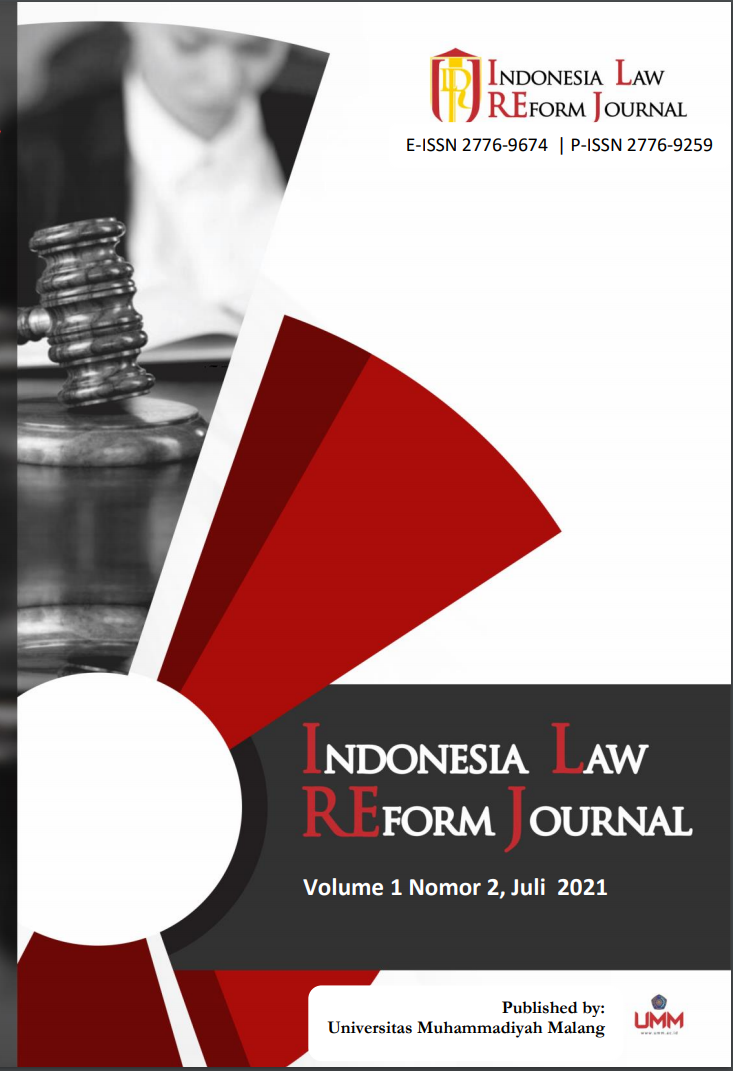Penerapan Asas Kebebasan Berkontrak dan Proporsionalitas dalam Perjanjian Kerja antara Pengusaha dan Pekerja di Banjarmasin
DOI:
https://doi.org/10.22219/ilrej.v1i2.17208Keywords:
Perjanjian Kerja, Asas Kebebasan Berkontrak, Asas Proporsionalitas, BanjarmasinAbstract
Employment agreements must contain the principle of freedom of contract and the principle of proportionality. However, in practice, these two principles often experience a degradation to be applied in work agreements that bind workers and employers. In addition, from a sociological perspective, the employer is a party that is higher than the workforce, in other words, the worker is the weak party. Workers do not have the freedom to determine what they want, so they just participate in work agreements made by default by the employer. The formulation of the problem from this research is how to apply the two principles into the Employment Agreement, then whether the application of the two principles provides legal protection for workers based on the Employment Agreement, and what factors are the supporting and inhibiting factors in the application of the two principles. The research method used by the author is sociological juridical research at company in Banjarmasin. From this study, the authors found the results that the application of these two principles at PT. Panca Teknik that is not yet fully implemented. This is because there are still conflicts with the law both in terms of the type and content of the work agreement. The inhibiting factor from the application of these two principles is the lack of socialization from the company regarding work agreements for workers.
Abstrak
Dalam perjanjian kerja yang menjadi suatu dasar yang mengikat, dikenal adanya asas kebebasan berkontrak dan asas proporsionalitas dalam perjanjian tersebut. Namun dalam praktiknya, kedua asas tersebut seringkali mengalami suatu degradasi untuk diterapkan dalam perjanjian kerja yang mengikat pekerja dan pemberi kerja. Selain itu dari segi sosiologis, pemberi kerja merupakan pihak yang lebih tinggi dibandingkan tenaga kerja, dengan kata lain yakni pekerja ialah pihak yang lemah. Pekerja tidak memiliki kebebasan dalam menentukan apa yang menjadi kehendaknya, sehingga turut saja dalam perjanjian kerja yang dibuat secara baku oleh pemberi kerja. Rumusan masalah dari penelitian ini yakni bagaimana penerapan Kedua asas tersebut ke dalam Perjanjian Kerja, lalu apakah penerapan kedua asas tersebut memberikan perlindungan hukum terhadap pekerja berdasarkan Perjanjian Kerja, dan Faktor apa yang menjadi pendukung dan penghambat dalam penerapan kedua asas tersebut. Metode penelitian yang digunakan oleh penulis yakni penelitian yuridis sosiologis di Perusahaan yang berada di Banjarmasin. Hasil penilitan menunjukan bahwa penerapan dari kedua asas tersebut pada Perusahaan yakni belum secara penuh diterapkan. Hal ini dikarenakan bahwa masih terdapat pertentangan dengan undang-undang baik dari jenis maupun isi perjanjian kerja. Faktor penghambat dari penerapan kedua asas tersebut yakni kurangnya sosialisasi dari perusahaan mengenai perjanjian kerja yang terhadap tenaga kerja.
Downloads
References
Anggraeny, Isdian, and Sholahuddin Al-Fatih. “Kata Sepakat Dalam Perjanjiandan Relevnasinya Sebagai Upaya Pencegahan Wanprestasi.” DE LEGA LATA: Jurnal Ilmu Hukum 5, no. 1 (January 7, 2020): 57–66. https://doi.org/10.30596/DLL.V5I1.3446.
Anggraeny, Isdian, and Nur Putri Hidayah. “KEABSAHAN PERJANJIAN KERJA WAKTU TERTENTU DENGAN KONSEP REMOTE WORKING DALAM PRESPEKTIF UNDANG-UNDANG CIPTA KERJA.” Jurnal Hukum Dan Kenotariatan 5, no. 1 (2021): 52–73. https://doi.org/10.1177/1059601115619548.
Betten, Lammy. The EmploymentContract in Transforming Labour Relations. Hague: Kluwer Law International, 1995.
Damayanti, Ratih. “Program Kemitraan Masyarakat Asosiasi Pengusaha Jasa Dekorasi Di Kota Semarang Tentang Perlindungan Hukum Bagi Pekerja Harian Lepas.” Journal Pengabdian Hukum Indonesia 2, no. 1 (2019).
Hernoko, Agus Yudha. Hukum Perjanjian Asas Proporsionalitas Dalam Kontrak Komersial. Jakarta: Pena Grafika, 2014.
Hidayah, Nur Putri, Isdian Anggraeny, and Dwi Ratna Indri Hapsari. “Credit Dispute Resolution with Mortgage Right Warranties on Conventional Banking.” Advance in Economics, Business and Management Research 121, no. Inclar 2019 (2020): 24–28. https://doi.org/10.2991/aebmr.k.200226.005.
Santoso, Budi, and Ratih Dheviana Puru H.T. “Eksistensi Asas Kebebasan Berkontrak Dalam Perjanjian Kerja.” Jurnal Arena Hukum 6, no. 3 (2012): 155–226.
Soerjono Soekanto. Penelitian Hukum Normatif: Suatu Tinjauan Singkat. Rajawali Press. Jakarta: Rajawali Press, 2018.
Sundalangi, Yofriko. “TINJAUAN YURIDIS PEKERJA FREELANCE BERDASARKAN PRINSIP KEADILAN THE JURIDICAL REVIEW OF FREELANCE WORKERS BASED ON THE PRINCIPLES OF JUSTICE.” Journal Tadulako Law Review 3, no. 1 (2018): 40–56. https://doi.org/10.1017/CBO9781107415324.004.
Suryono, Leli Joko. “Kedudukan Dan Penerapan Klausula Baku Dalam Perjanjian Kerja Di Indonesia.” Jurnal Media Hukum 18, no. 1 (2016): 35–49.
Downloads
Published
How to Cite
Issue
Section
License
Copyright (c) 2021 Kemal Juniardi, Komariah, Dwi Ratna Indri Hapsari

This work is licensed under a Creative Commons Attribution-NonCommercial-ShareAlike 4.0 International License.











